
With one natural ingredient, it’s easy to remove rust from tools, heavily corroded antiques, and other metal objects.
Read on to learn how to remove rust with this simple method: Soak the rusty tool in citric acid for several hours, remove it from the water and wipe down the tool to remove rust from crevices. No elbow grease needed!
In this article, I show how this method removes rust faster than vinegar, easier than scrubbing, and naturally – without the harsh chemicals in caustic rust removers.
A few months after I sold my first horse, I was walking through the pasture and found a shoe he’d lost sometime in the year before. Looking at it, I thought it would be a nice keepsake- and something I could use to create an equestrian project with sentimental value- but it was covered with layers of rust.
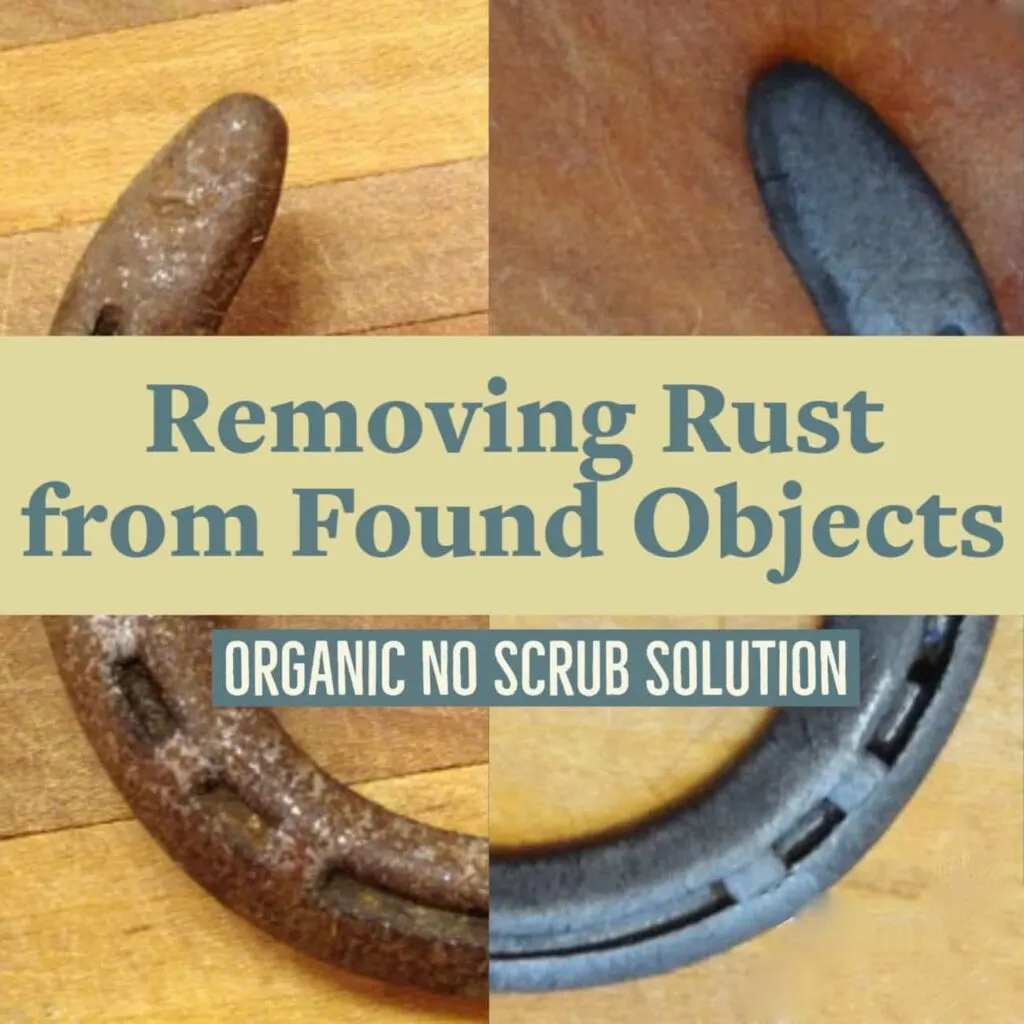
I’d been experimenting all winter with using citric acid to clean rust off garden tools that I, in my distractability, tend to leave out in the elements. As it turns out, the basic combination of citric acid, water, and time completely removes rust from metal. I was pretty thrilled, especially after trying and mostly failing to remove rust from tools with caustic chemicals. A common ingredient in canning recipes, citric acid is an organic acid a little stronger than vinegar, depending on the concentration you mix it in.
2022 Update: I’ve loved reading your feedback on this article and how many of you have found this tutorial useful! Man of the comments have suggested replacing citric acid with vinegar and soaking a little longer, but my tests showed it doesn’t actually work as well, and costs quite a bit more.
The following section may contain affiliate links. As an Amazon Associate, we earn from qualifying purchases.
Supplies You’ll Need for No Scrub Rust Removal:
- A bucket or plastic container large enough to hold your rusted object(s)
- Very hot water
- A surface treatment for raw metal. Oil or clear coat varnish works.
- Pure Citric Acid – You can buy this wherever canning supplies are sold, however, the pricing on citric acid sold for canning includes a huge markup. As of spring 2021, Ball brand citric acid is priced over $1/ounce but a 5 lb bag of food-grade Citric Acid is 25¢/ounce.
- (For products that can’t be soaked, check out Bar Keeper’s Friend Soft Cleanser)
My advice is to order in bulk and don’t worry about having too much – it’s SO handy for cleaning! A tablespoon of Citric Acid is great for boosting dishwasher detergent, descaling coffee makers, getting grime off pots and pans, removing hard water stains, and general cleaning. You can use it in cooking too- soaking cut apples in a weak citric acid solution to prevent browning, or adding a tablespoon to bone broth at the beginning of the cooking process to help break down bone and transfer nutrients into your broth.
Instructions:
Prepare Acid Bath
Fill your bucket with very hot water and stir to dissolve the citric acid powder completely into the water. There should be no grit remaining at the bottom of the bucket.
Submerge Rusty Item in Solution
Allow Rusty Object to Soak
Continue soaking your object until you see visible results. Some items will be rust free in hours, while others may take a full day or multiple soaks. After a day you may want to remix your citric acid solution, because it will slowly lose acidity as it breaks down the rust. If you are a fan of instant gratification as I am, you may want to do a bit of scrubbing to speed the process.
Speed the Rust-Removal Process with an (Optional) Scrub
The above image is how my rusty objects looked after 2 hours in the solution and a quick wipe with a paper towel.
Remix & Resoak if Needed
When finished, the solution is safe to discard down a drain- the chemical reaction that dissolves the rust will have neutralized the acid, making it harmless for most household pipes (if any pieces of rust have broken off and settled at the bottom of the bucket, do NOT put these down a drain, and instead discard in the garbage).
Seal the Rust Free Metal
IMPORTANT: You MUST protect the finish. If left uncoated, the unprotected metal will rust again almost instantly. To prevent new rust from forming, You can apply clear coat / lacquer, spray with cooking oil and wipe away the excess, or jump over to my tutorial for creating an antique gold finish (which looks great AND prevents rust).
Scrubbing is optional but speeds the process up significantly. The acid will loosen before it completely dissolves the rust, so much of the rust can be effortlessly wiped off after an hour or two in the solution.
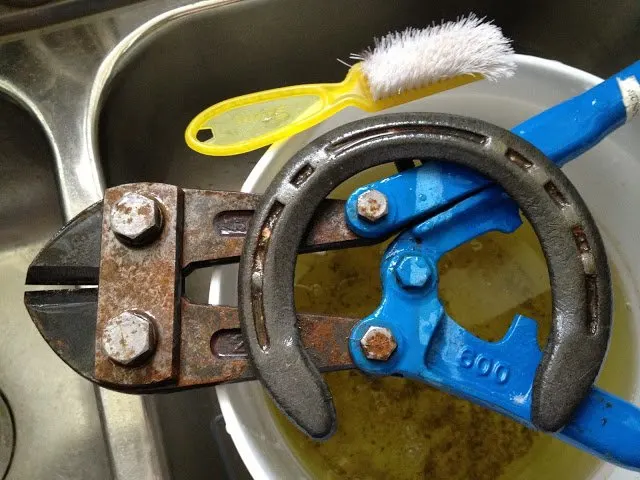
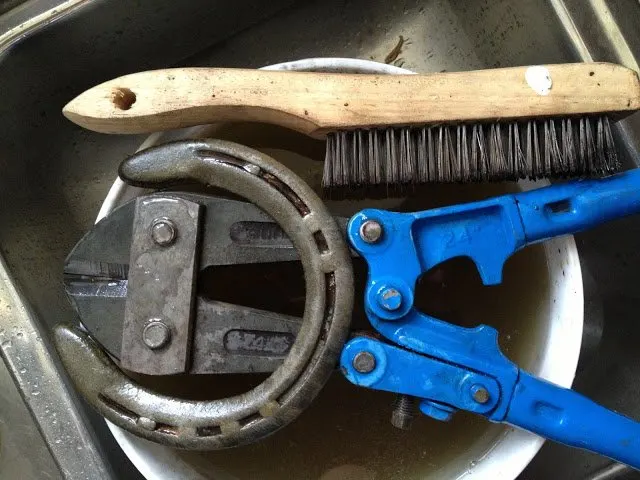
In this photo you can see the yellow-tinge the solution takes on as it is working, as well as the loosened rust sediment that will settle in the bucket.
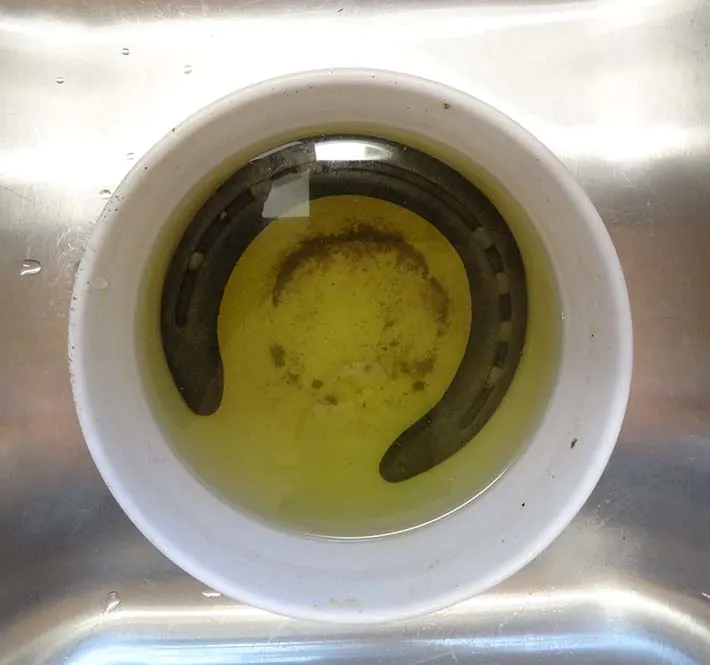
If you’ve cleaned up a keepsake horseshoe or bit, I have a few tutorials on how to display them in my post: How to Mount a Keepsake Horseshoe. Or you might like my advice for pricing vintage metal items for a flea market booth.
2022 Update: Vinegar vs Citric Acid
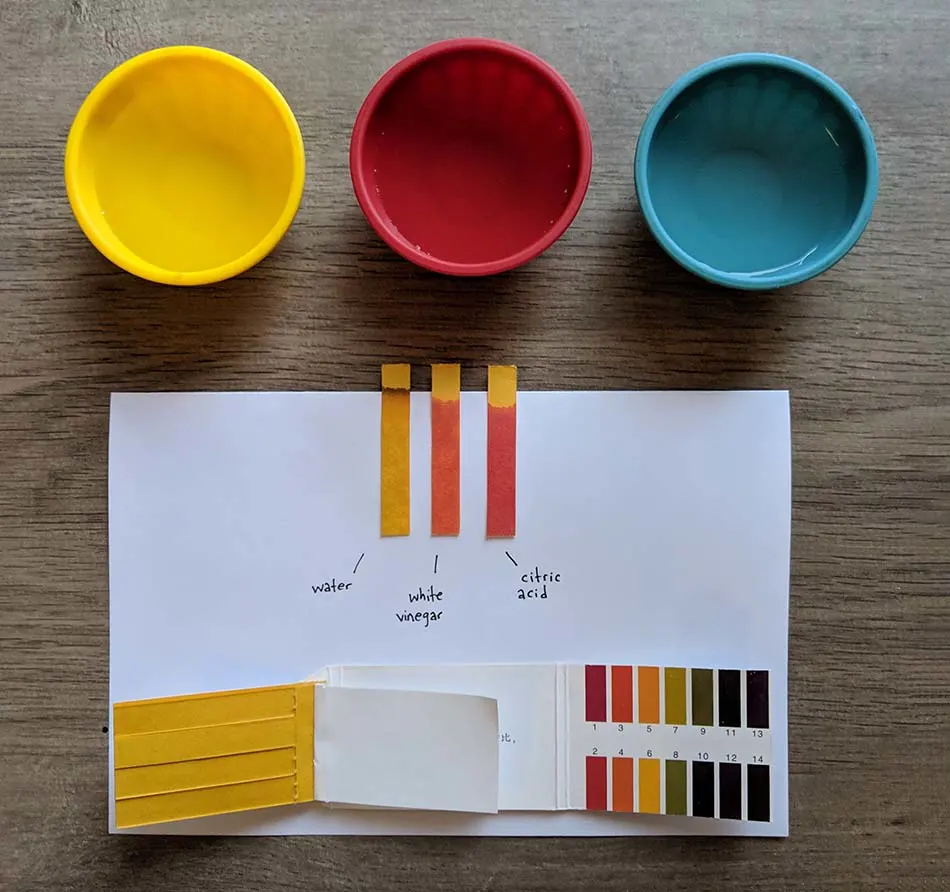
Since published, this article has traveled far and wide and collected a lot of feedback comments- many advising to “just use vinegar” was a comparable technique. Recently, I decided to do a side by side comparison of vinegar vs citric acid in my kitchen. Without repeating the entire rust removing process (difficult to compare with scrutiny, since no two objects rust exactly alike) I ordered some pH testing strips.
To be the “better” rust-removing solution, the winner would need to be 1. higher in acidity, 2. lower in cost, or 3. both. My suspicion was that citric acid would win by a landslide, but my experiment progressed.
I mixed one cup of citric acid solution at the concentration recommended above (.33 cup per gallon, or in this case, the ratio scaled down to 1 tsp citric acid to 1 cup water) and tested it against a leading name brand of undiluted white vinegar.
RESULT #1: ACIDITY
At the recommended dilution, Citric Acid solution is slightly more acidic than vinegar– matching the scale in my pH testing kit at a pH of 3, compared to the name brand distilled white vinegar at pH 4. (Interestingly, according to the internet, the pH of distilled white vinegar should be between 2-3, meaning either my name-brand vinegar was weak or, more likely, my pH testing kit was not lab-accurate. Even if this is the case, I anticipate the values relative to other values read by the same test strips should generate accurate comparisons)
But how do they measure up in terms of cost? Read on
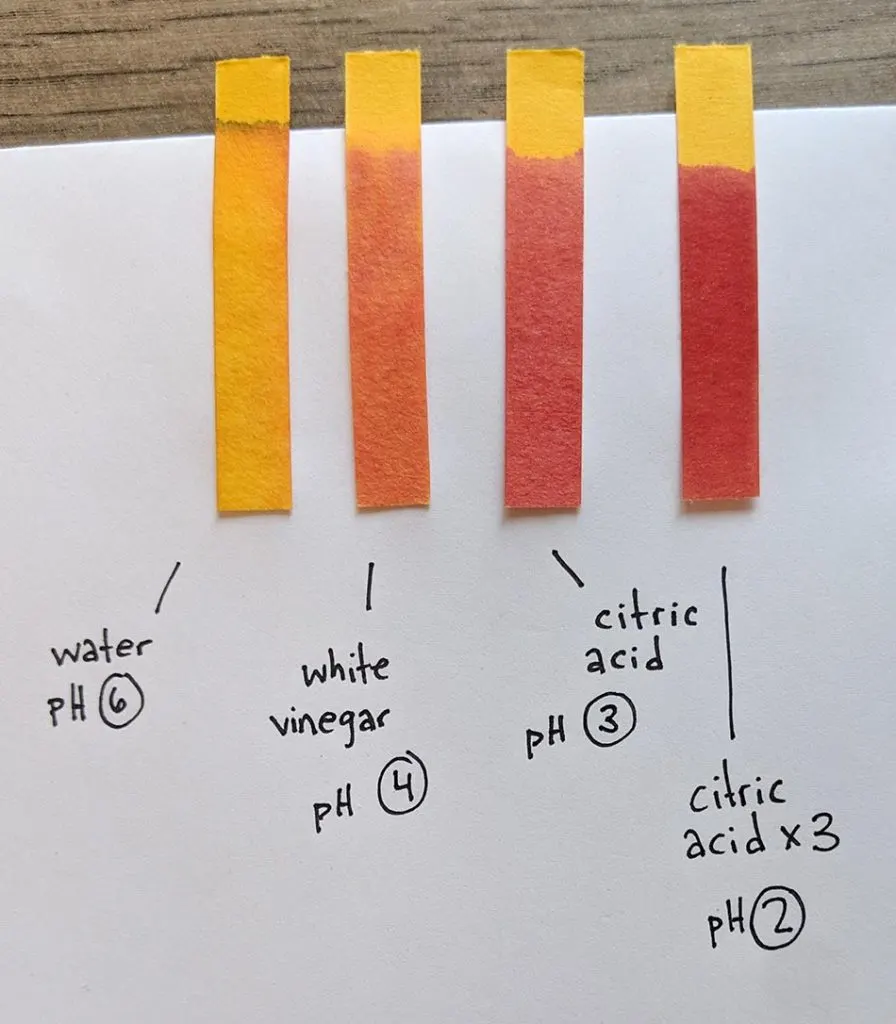
RESULT #2: Cost of Vinegar vs Citric Acid
For one gallon of cleaning solution (just enough to clean an average-sized tool or a few horseshoes), you need either 1 gallon of vinegar or 1/3 cup of citric acid mixed with tap water. (To make the math easy, let’s say .5 cup of powered citric acid)
At major grocery outlets, a gallon of vinegar seems to run about $3-$4.
Currently, citric acid powered in bulk (5lbs) is $15 for 5 lbs. Citric Acid powered weighs about 2 cups per pound. The 5 lb bags, then, contains 10 cups, resulting in a cost of roughly $1.50 per cup of powder. The one half of a cup required to make a gallon of rust removing solution, then, comes in at right around 75¢
Therefore, rust treatment with citric acid costs less than 75¢ per gallon, while the same process with white vinegar costs $3-$4 per gallon. Given that the citric acid solution is stronger, and thus faster acting, it’s the better choice for rust removal through no-scrub soaking.
☕ Hawk-Hill.com is reader-supported. If this article saved you time or money, please consider donating $1 to help me cover the cost of hosting this website OR If you appreciate this information and want to throw a “Thanks!” my way by buying me a coffee – I would Of Course appreciate it! :]
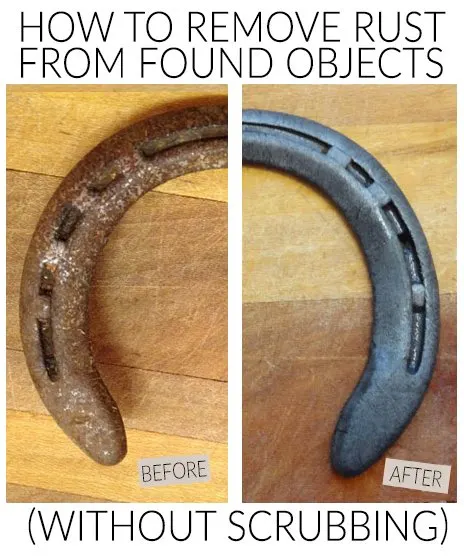
Using Citric Acid to Remove Rust from Things that Can’t Be Soaked.
While this tutorial is a low-effort and speedy way to remove rust from tools without scrubbing, it has its limitations. large and bulky objects cannot be dropped into a bucket for soaking.
Recently, I ran into this problem in Hawk Hill Cottage, and I came up with a solution worth adding as an update to this post. The cottage features only one full bathroom, but oh, it is a glorious bathroom! A large skylight opens up over the shower to add a view of the sky and swaying trees visible from the shower. Recently updated and clean bright white, the only eyesore in this bathroom was an ugly red rust stain in the bathtub.
Not Even Professional Cleaners Could beat this stain
Even the professional cleaner hired to clean the cottage before I moved in couldn’t get this ugly red stain out of the tub. I was determined, however, that I would. So I set out to experiment with various cleaners.
I won’t run through my laundry list of tub and tile cleaners I tried on my bathtub’s rust stain, but suffice to say it was more than a few (and a lot of elbow grease!) Nothing even touched my rust stain.
One day, though, as I was reading the instructions on the bottle of Bar Keeper’s Friend Soft Cleanser, I noticed that citric acid was listed among the primary ingredients. I wondered: “Could this be my solution?”💡 Bar Keepers Friend, since it is a thick, viscous liquid, might stay in place when dabbed on the stain (rather than running off like a liquid or immediately drying like other cleaners).
Excited to try my theory, gloved up and poured a small pool of bar keepers friend onto my tub’s rust stain one night before bed. I didn’t scrub at all, I just dumped a small amount of this citric acid-containing cleaner directly on the stain and hoped for the best.
Results were IN the lack-of-stain I found the next Morning!
The next morning- I won’t lie- I woke up excited to clean my shower! (That might be a first for me) I grabbed a small scrubber and began gently scrubbing away the crust that Bar Keepers Friend had dried into overnight. To my delight, I found that the ugly red rust stain had entirely dissolved overnight after being soaked in the cleaner containing citric acid. I never even had to scrub except for the bit of elbow grease required to remove the dried cleaner from the tub.
Unfortunately, since I tried this project on a whim- without much hope of success, I didn’t document this rust removal success, but you can bet I’ll have my eye out for a rust stain to demonstrate how a viscous cleaner containing citric acid can remove rust from surfaces that can’t be soaked.
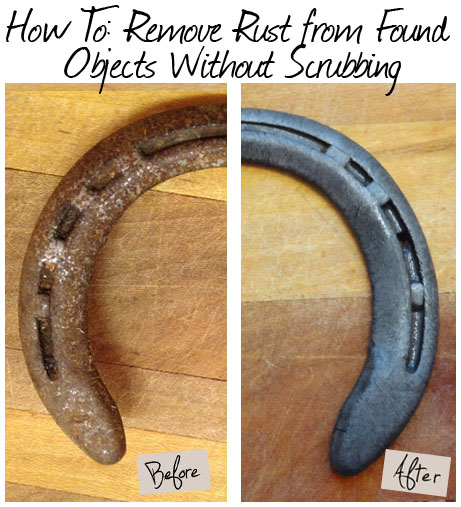
Finally – here’s a cool comparison video in case it’s helpful :]
Spoiler – What I outlined above is the best for your money option! 🤑
Thanks for Reading!!!
I hope you can tell that I love DIY, researching the best affordable solutions for every-day problems opportunities and documenting / sharing solutions!🙌 Hawk-Hill.com is reader-supported.
☕ Hawk-Hill.com is reader-supported. If this article saved you time or money, please consider donating $1 to help me cover the cost of hosting this website OR If you appreciate this information and want to throw a “Thanks!” my way by buying me a coffee – I would Of Course appreciate it! :]
Reader Questions and Recommendations
Readers, do you have any favorite topics / posts? What would you like to read more about in the future? As I hope you can tell from this and other articles on my site, I really enjoy DIY / a good challenge, and I’m not afraid to roll up my sleeves to figure out a great, and hopefully simple 😁 solution. So please feel free to let me know in the comments below (or reach out via social media)!
Ok Really – I’ll try to wrap this up now😂
Finally, if you’d like to continue to learn about interesting DIY options as well as how YOU can tackle creative new projects consider checking out the latest and most popular articles listed on the Hawk-Hill Home Page. I’m always trying to enjoy and write about the creative side of life so please don’t be a stranger – check back often!😍
If you enjoyed this post you may also enjoy reading / perusing / devouring😊 one or all of these articles as well!
- 💡4 Easy Steps to Make Your Own Sea Glass 🌊
- ❤️Bedroom Decorating Ideas for Single Women’s Master Bedrooms 🛏️
- 🏡Ikea Kitchen Cost: What I Spent for a 9×12 Kitchen Remodel 💵
How to Add a Plug to a Hardwired Light Fixture or Chandelier
DIY: My Method for Painting an Antique Gold Patina Finish on Frames

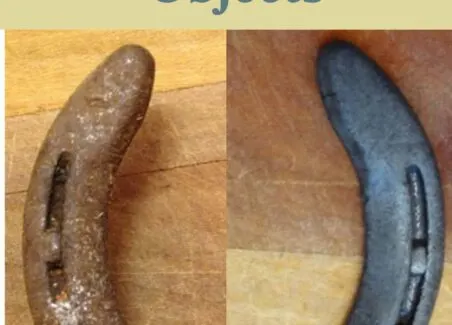
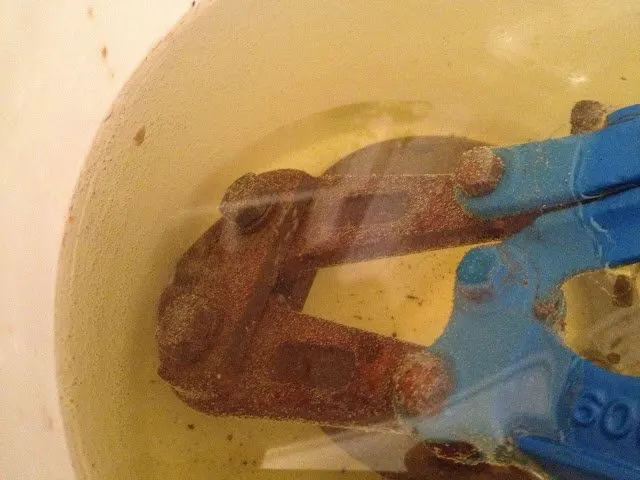
Wayne Morris
Saturday 21st of September 2024
In restaurants a citrus oil drip is used on the plumbing to dissolve grease in the pipes and keep them clog free. I have not tried it on rust but it is a powerful cleaner and will melt a Styrofoam cup.
Wayne Morris
Saturday 21st of September 2024
Citric acid will also dissolve salt. Our ship had an evaporator to make fresh water from sea water. Due to some operating errors the sea salt hardened inside the copper nickle piping to the evaporator and it ceased to function. Ten days later we still only had water to drink from out storage tanks. The person in charge of the evaporator asked me if I had any ideas. Do you have the tub of dry citric acid tat is supposed to be used to prevent that problem? No they left it ashore. So go to the cook and see if they have any Country Time lemon Aid and apply it to the piping. The citric acid removed enough of the salt inside the pipes that we were able to once again make water and take showers for the first time in 10 days. They later replaced all the piping when we got back to home port.
Maureen
Sunday 21st of May 2023
The best rust remover for me was the citric acid. No smell, safe to use, environmentally safe natural ingredient that did a terrific job!! Thnxs
Lindsayanne Brenner
Wednesday 31st of May 2023
So glad to hear that this helped!
Graxxor Vidhelssen
Tuesday 17th of January 2023
Not only that, but citric acid is largely odour free, (of course it smells when dissolving rust)... However, I've found that vinegar tends to have a distinctly... erm... vinegary odour... which fills the room and stays far longer than the acid bath itself.
Fantastic article. I have been hit with the cleaning bug and now I'm soaking a whole plethora of rusty tools, nuts and bolts.
Brian
Thursday 23rd of June 2022
Tip for treating your newly de-rusted metal. If you're going to put it in a hot oven for drying, increase the temp and the time. By the way, putting it into a "Hot" oven is a misnomer. Metal always does better being heated when it starts out slowly, so put it in a cold oven and let it come up to temp along with the oven. Increase the temp to 500 degrees and leave it in for an hour minimum. If your oven will go higher, go up to 550 or even 600 degrees. You will notice the metal turning a blueish color - no problem. Now you have two choices or options depending upon what you want your finished product to look like. If you want a painted look, spray paint - the 2X kind with the paint and primer already mixed - or a good Rustoleum enamel based paint works best. Have a paint area already set up with some sort of a bench or table that will not burn with the hot metal from the oven. Some things I will hang from a wire hanger so that I can spray all sides without the need to turn it over. For other things where the back side is not critical, an old cookie baking sheet works well. What you will end up with is a "Baked-On" Enamel or a "Poor Man's" Powder Coat. Just make sure to be ready to spray as soon as it comes out of the oven so you can get a good bake. Several lite spray sessions in quick succession work well since the piece is still hot. The paint will dry quickly and new coats can be applied a lot sooner than you think. The first coat may bubble - not to worry it's the baking process and future coats will cover. Your final finish will look very professional. Now, option number 2. If you don't want a painted look but prefer a more natural look, take the hot metal out of the oven and dunk it in cold oil. Any oil will work, cooking oil or even used motor oil. Allow the hot metal to cool down in the oil bath. This is similar to a "Blueing" method like gunsmiths use to keep firearms from rusting. The hotter the metal when it comes out of the oven, the better the finish will be...so don't be in a hurry and keep it in the oven as long as you can. Your container for the oil should either be a metal bucket or stock pot or you should have a way to suspend the item in the oil bath if the tub is plastic. The metal will not cool fast enough before it melts a hole in the tub and all the oil runs out....so be careful. Also be careful when taking the item out of the oven. I like to use welder's gloves and something like a vise-grip to remove and carry the item to where it will be painted. Always think safety. Good luck.